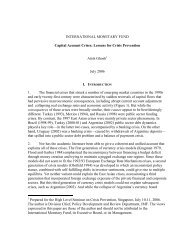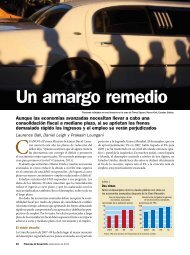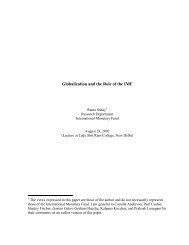Chapter 20: Taxation of Corporate Reorganizations - IMF
Chapter 20: Taxation of Corporate Reorganizations - IMF
Chapter 20: Taxation of Corporate Reorganizations - IMF
You also want an ePaper? Increase the reach of your titles
YUMPU automatically turns print PDFs into web optimized ePapers that Google loves.
Tax Law Design and Drafting (volume 2; International Monetary Fund: 1998; Victor Thuronyi, ed.)<br />
<strong>Chapter</strong> <strong>20</strong>, <strong>Taxation</strong> <strong>of</strong> <strong>Corporate</strong> <strong>Reorganizations</strong><br />
agreement to optimize their joint tax situation at the expense <strong>of</strong> the government, particularly<br />
when both companies are members <strong>of</strong> the same corporate group. 22<br />
B. Tax Position <strong>of</strong> the Shareholders <strong>of</strong> the Transferor<br />
1. Taxability <strong>of</strong> Shareholders<br />
Whether the shareholders are taxed in a taxable reorganization is determined by the<br />
general rules on the taxation <strong>of</strong> capital gains. These rules vary in many tax systems depending<br />
on the category <strong>of</strong> taxpayer that realizes a capital gain and on the purpose for which the shares<br />
are held (business or private investment). 23<br />
Some countries tax all capital gains on shares regardless <strong>of</strong> who holds the shares and why<br />
the shares are held. Consequently, the transfer <strong>of</strong> the shares <strong>of</strong> the acquired company in<br />
exchange for the shares <strong>of</strong> the transferee company, bonds, cash, or other forms <strong>of</strong> compensation<br />
is a taxable event, absent special nonrecognition rules. 24<br />
In many other countries, however (in particular in the European Union, with the<br />
exception <strong>of</strong> the United Kingdom and the Scandanavian countries), individual shareholders are<br />
not taxed on the gains resulting from the sale <strong>of</strong> shares when the shares are held on a long-term<br />
basis for private investment. 25 The gains will also be exempt when realized by charities or other<br />
exempt organizations. In some countries, however, gains on shares are taxable when the<br />
individual shareholder holds a "substantial" share in a company. 26 When an individual<br />
shareholder holds shares for business purposes, practically all countries will tax the gain realized<br />
on the sale or exchange <strong>of</strong> the shares.<br />
Shares held by companies are a special case. Many tax systems treat them as assets held<br />
for business purposes, and, consequently, any gain on the sale or exchange <strong>of</strong> shares is a taxable<br />
event. However, some countries (e.g., Belgium and Netherlands 27 ) consider the gain realized on<br />
22 In a transaction between unrelated parties, one party can compensate the other party by an adjustment in the<br />
purchase price if the latter agrees to bear a greater tax burden. The problem <strong>of</strong> possible abuse in a transaction<br />
between related parties can be addressed through a general rule that gives the tax administration the power to<br />
readjust transfer prices between related taxpayers and in some cases (such as tax evasion) even between unrelated<br />
taxpayers, so as to reflect the fair market value <strong>of</strong> the transaction for tax purposes. Such a rule is not specific to<br />
reorganizations. See vol. 1, at 53; ch. 18 supra.<br />
23 See supra ch. 16, sec. VI(B).<br />
24 For example, in the United Kingdom there is a special capital gains tax, which also includes pr<strong>of</strong>its on shares held<br />
for private investment. See GBR TCGA §§ 2, 21.<br />
25 See, for a survey <strong>of</strong> capital gains tax rates for individual shareholders, Ruding Committee Report, supra note 21, at<br />
273.<br />
26 See NLD IB § 39 (33 percent); BEL CIR § 90/9 (25 percent); FRA CGI § 160 (25 percent); DEU EstG § 17 (25<br />
percent).<br />
27 See BEL CIR § 192; NLD Vpb § 13(1)(minimum 5 percent participation required); Van Soest, Inkomstenbelasting<br />
454 (1990).<br />
- 8 -
















